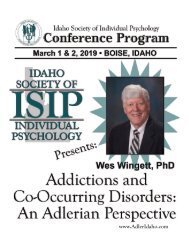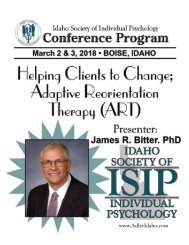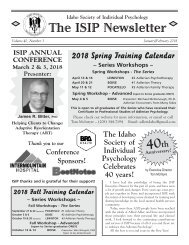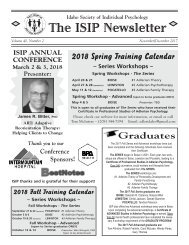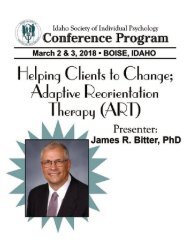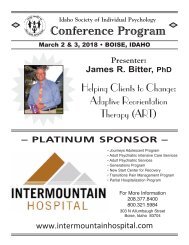May Newsletter 2020
Create successful ePaper yourself
Turn your PDF publications into a flip-book with our unique Google optimized e-Paper software.
2
The 1st of 9 Principles of Adlerian Psychology ~Wes Wingett
People are social beings seeking ways to connect and
contribute in families, schools, and communities.
People are social beings who want to contribute and belong first in a family,
then in an educational setting, and then in the larger community.
Alfred Adler was born on the outskirts of Vienna, Austria in 1870.
His father was a grain merchant, his mother did not work outside the family
home that eventually included seven children, and Alfred was the second
child and the second son. Adler’s experiences and his theory were impacted
by some events within his family of origin. When Adler was four years of
age his brother Rudolf died in the same room where they both slept. Adler’s
family was impacted by an economy characterized by many peaks and
valleys and times of economic insecurity. Adler’s family was a Jewish family
in a predominantly non-Jewish area.
Alfred Adler has been considered to be one of the first social
psychologists. His theory and practice centered on understanding and
empowering democratic leadership in three social arenas, the family, the
school, and the community. Democratic leadership would be characterized as environments embracing the
idea of freedom with order in families, schools, and communities. Democratic leadership would be contrasted
with autocratic leadership characterized as order without freedom and anarchy characterized by freedom
without order.
In addition, Adler believed that at birth humans entered a family seeking connection and needed help
from others to evolve into socially responsible individuals. Eventually each individual in the family would
contribute to the good of the family. This tradition of helping others hopefully would continue in schools and
communities.
After finishing medical school Adler wrote his first publication focusing on a social problem, that is,
the working conditions of tailors. In 1895 Adler identified a social problem, described the social problem, and
created possible solutions to treat that specific problem.
After his fourth tour of duty in the military, Adler returned to Vienna in 1919 and began working with parents,
teachers, and students in child guidance centers in Vienna. The movement toward learning democratic
principles in families and schools were introduced in post-World War I Vienna. Families that had been
impacted by war characterized Vienna. Families were affected by the death and injuries of loved ones, families
were affected by division and displacement. Some families were living in poverty. Adler and his associates
began working with Viennese families and their teachers.
Adler and his colleagues worked together to encourage and empower personal and social
understanding and responsibility in families and schools. In the early 1930’s 33 child guidance clinics had been
established in Vienna.
Adler’s work in communities continued after his completion of medical school, the writing of his first
paper, and the opening of a medical practice that was located near the circus in Vienna where people with a
variety of issues sought his help.
Adler’s influence and his socially forward thinking have influenced families and schools through family
and teacher education. His influence in the community has impacted psychiatric hospitals and psychiatric day
care centers, all Twelve Step programs, and positive and productive work place relationships.
Adler’s theoretical emphasis on equality, education, encouragement, empathy, creative problem solving, and
personal and social responsibility has positively influenced families, schools, and communities.







